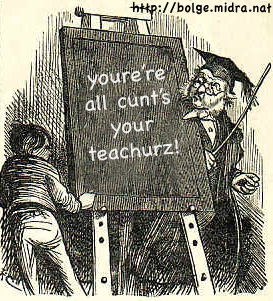
Sometimes, whilst ploughing through the semi-literate prose which comprises [I’d guess] 99,9% of the content on the internet, I find myself wondering if anyone else on the planet can actually spell and understand basic English grammar? I’m not talking about the plankton-brained kids of today and their teeth-grindingly irritating "…u no wot I want cuz u is gr8…" SMS inspired terminal illiteracy, but seemingly intelligent 'Grown-Ups' who, in the middle of an otherwise coherent paragraph, will suddenly drop in a "… you know what your doing…" or an "..I went to see there new house…".
I don’t know about anyone else, but when my eye falls on something like that, I just think "I’m sorry. You may be making a valid point, or a cogent argument, but I just can’t help thinking you’re a fuckwitt now!"
So, in the interests of my sanity and for the education of the rest of you, I present "Madra’s Simple Guide to English Grammar and Spelling" Now sit up straight and pay attention… and you boy at the back! Get rid of that chewing gum!
madra’s Simple Guide to English Grammar and Spelling
1: The Apostrophe:
The apostrophe is used to indicate a place in a word where a letter or letters have been omitted, or where two words have been welded together in the interests of brevity. Thus in the word "don’t", the apostrophe represents the missing "O" in the words "do not". It follows from this that:
-
Your = something belonging to you [eg. your hat].
-
You’re = 'you are' [Contraction. Apostrophe representing missing "A"].
-
There = in that place [eg. over there].
-
Their = belonging to them [eg.their hats].
-
They’re = 'they are' [Contraction. Apostrophe representing missing "A"].
It’s not exactly fucking brain surgery, is it folks?
2: Pronunciation != Spelling: :
[For the English]. Just because you don’t pronounce your "R"s doesn’t mean they don’t exist. ie. "Draw" is something you do with a pencil. The thing in your bedside cabinet that you keep your socks and grundies in is called a "Drawer".
3: Pronunciation != Spelling: :
Just because you pronounce your "A"s as "E"s doesn’t mean you spell that way too. ie. Fred is not taller then you. He is taller than you. Think about it - "than" is a comparative and "then" refers to a period of time. Again, this is not exactly Advanced Nuclear Physics.
4: Mean What You Say. Say What You Mean: :
When you say "I could care less about <Something>", you are informing the world that it would be possible for you to give less of a shit than you do at the moment about that particular thing. In other words you are announcing that you do care to a certain extent about something you are trying to convey total disinterest in. You are saying the exact opposite of what you are attempting to say. The phrase you are doubtless looking for is "I couldn’t care less about <That Thing>".
One handy technique that many advanced linguists use to avoid falling into this trap is to actually look at the meanings of words they are about to utter, rather than letting them spew from their mouths with no forethought whatsoever.
5. The Full Stop: [or 'Period' as the Yanks call it] is used to break up text into meaningful, self-contained pieces called 'Sentences'. Just because you’re obviously one of those people who speaks without stopping for breath, doesn’t mean you have to write that way too…. In fact it’s really annoying when you read a long screed of text with no commas or full stops you don’t know where one part ends and the next begins it almost leaves you feeling out of breath reading it yourself so it does its a really really silly thing to do and not something I would ever do no way!
6. The Comma: A bit of a tricky one this. It’s used to indicate a pause in a sentence, but one that falls just short of requiring you to start a new one. A classic example would be "I have red, green, blue and yellow hats". I accept that use of the comma is a bit subjective and owes much to the individual’s writing style. However it is, extremely bad form to just stick, them in seemingly at random, into the middle of a sentence because, you seem to think it’s, some kind of milepost that you have to put in every, ten or fifteen words to try and make your writing look grown up, especially if you’re not, using proper sentences, in the first place.
7. The Apostrophe : By the way folks, apostrophe followed by "S" is a way of indicating ownership or belonging, as in "That is Fred’s hat". It is not the way you form a plural. Therefore "Hat’s for sale" leads me to think that you are selling some undisclosed object that belongs to a hat.
8. The Apostrophe : Seriously. If you can’t wrap your head round the mind-boggling concept of the apostrophe, don’t just try throwing some words and parts of words together with one in the middle and hoping it’ll work. "Your’re" is not a real word. Neither is "Youre’re". If you don’t know what you’re doing, just 'Put the apostrophe down, Son' and write out the word[s] in full "I think youre’re an idiot" will always say more about the sender than the recipient!
OK. That’s enough to be getting on with for now. Next week we’ll be discussing the age-old adage "Empty vessels make most sound". In particular we’ll find out that TYPING AN ENTIRE PARAGRAPH OF TEXT IN CAPITAL LETTERS DOESN’T ACTUALLY MAKE PEOPLE THINK "WOW! THIS GUY’S GOT SOME REALLY FORCEFUL OPINIONS AND IS A REALLY OUTSPOKEN AND FORTHRIGHT DEBATER!" Instead, it makes them scroll past the "Big shouty loudmouthed cunt" to read what the next person has to say.
Class dismissed!
